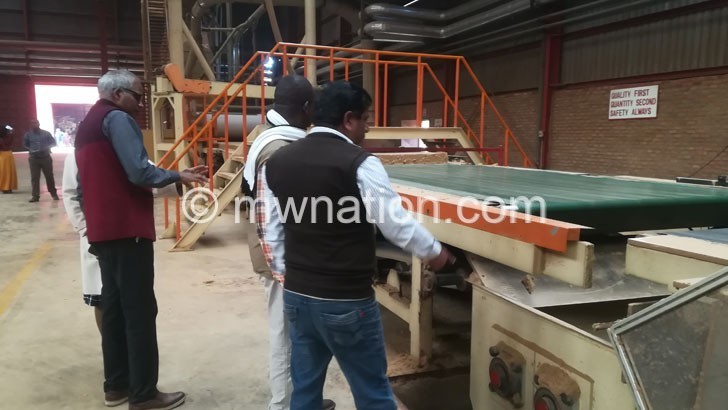EPZ firm faces export hurdles
One of Export Processing Zone (EPZ) factories, Raiply Malawi Limited, says it is facing challenges in exporting its products as the local market only consumes 30 percent of the firm’s total output.
The factory, which is the first of its kind in Malawi and touted as the second largest in Southern Africa, produces medium density fireboards used in furniture and construction industries.
It uses waste, thinning materials and tops of trees, which cannot be used in the main factory.
In an interview on Saturday when officials from the Ministry of Natural Resources, Energy and Mining visited the company, Raiply chief executive officer Khrishna Das said the export market is unstable; hence, the need to look for other markets.

While acknowledging that the local market is also growing, he said the company needs to expand its reach on the global market because it produces more than the local market can absorb.
Said Das: “We cannot sell the entire volume of production on the local market, we have to fetch for the export market. But export market is not always stable. There are various factors such as transport cost and exchange rate.
“Countries such as South Africa and Tanzania have their own ports. So, a lot of materials are being imported in these countries. All those are deciding factors.”
“This time we are facing huge problems with exports, especially into South Africa because their currency is unstable. We are now trying to expand our market to other countries such as Tanzania, Zimbabwe and Zambia.”
Ministry of Natural Resources, Energy and Mining chief director Bright Kumwembe said he was impressed with work being done under EPZ.
He said: “It is impressive. The technology is going up very fast, you will appreciate that from a tree, you can press it down, get a fibre and turn those fibres into anything that you want.
“There is a lot happening, and we are happy that Raiply is making money, at the same time, government is also making money.”
During the opening of the factory in November 2017, President Peter Mutharika said the venture will transform the economic landscape of the country as it will not only save foreign exchange, but also maximises the utilisation of natural resources.
Raiply started operating in March 1999 following the purchase of Viply as part of the government’s privatisation programme.
The concession agreement signed between government and Raiply gives the company exclusive rights to utilise the forest resources within an area of nearly 20 000 hectares, with the trees and land remaining the sole property of government.
An EPZ is any area approved by Minister of Industry, Trade and Tourism for the purpose of manufacturing of export products to promote economic growth and attract foreign direct investments.
The zones offer incentives such as import duties and exemptions.





